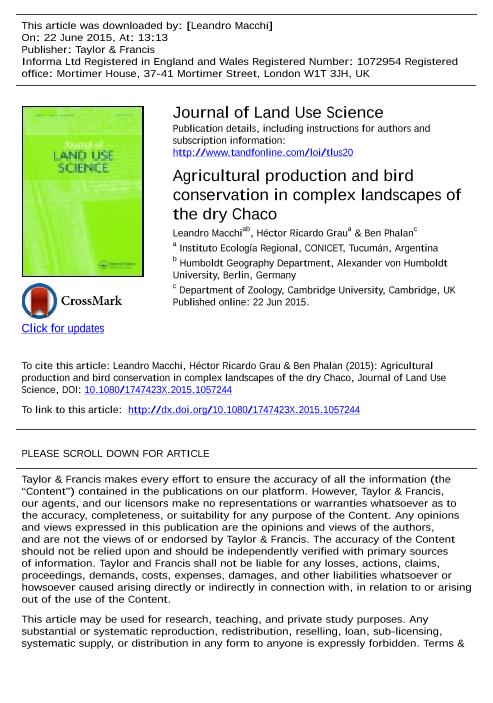Mostrar el registro sencillo del ítem
dc.contributor.author
Macchi, Leandro

dc.contributor.author
Grau, Hector Ricardo

dc.contributor.author
Phalan, Benjamin
dc.date.available
2017-02-13T22:03:24Z
dc.date.issued
2015-06
dc.identifier.citation
Macchi, Leandro; Grau, Hector Ricardo; Phalan, Benjamin; Agricultural production and bird conservation in complex landscapes of the dry Chaco; Taylor & Francis; Journal Journal of Land Use Science; 11; 2; 6-2015; 188-202
dc.identifier.issn
1747-423X
dc.identifier.uri
http://hdl.handle.net/11336/12965
dc.description.abstract
The South American dry Chaco is a mosaic of woody vegetation and grasslands with high deforestation rates in recent decades. Considering forests and grasslands as the main natural habitats, we assessed the trade-offs between bird populations and agricultural production to compare the potential consequences of different land use strategies (‘sharing’, ‘sparing’, and intermediate) for populations of bird species sensitive to agriculture, while attaining a regional production target. We evaluated how populations responded to scenarios with different proportions of forest and grasslands, considering three reference states (100% forest, 80:20% and 50:50% forest and grasslands, respectively); and scenarios capable of meeting three after-farming scenarios, with land destined to reach a regional production target with three variations of forest:grasslands within spared land. We fitted curves to relate bird abundance to agricultural yield along a gradient of meat production intensity; and we classified bird species as ‘losers’ (if their populations were lower than the baseline population in the reference state, at any level of production) and ‘winners’ (if their current populations were higher than the baseline population). At the ‘current’ (c. 2010) level of regional agricultural production, we found a similar number of loser species maximized by land-sparing and land-sharing strategies; while intermediate strategies were the least favourable to balance production and bird populations. Under the most probable scenarios of increases in regional meat production, most loser bird species populations were maximized by a land-sparing strategy, suggesting that if meat production targets are going to increase in the region, this can be more efficiently achieved by combining well-protected forests and grasslands, and high-yielding mechanized agriculture (e.g. soybean). Our results highlight the importance of assessing all the important natural habitats (e.g. forests and grasslands) of a region to explore conservation strategies at a regional scale.
dc.format
application/pdf
dc.language.iso
eng
dc.publisher
Taylor & Francis

dc.rights
info:eu-repo/semantics/openAccess
dc.rights.uri
https://creativecommons.org/licenses/by-nc-sa/2.5/ar/
dc.subject
Sustainability Science
dc.subject
Land Use Change
dc.subject
Ecological Indicators
dc.subject
South America
dc.subject
Semi-Arid Environment
dc.subject
Land Sparing
dc.subject
Land Sharing
dc.subject
Conservation Strategies
dc.subject.classification
Conservación de la Biodiversidad

dc.subject.classification
Ciencias Biológicas

dc.subject.classification
CIENCIAS NATURALES Y EXACTAS

dc.title
Agricultural production and bird conservation in complex landscapes of the dry Chaco
dc.type
info:eu-repo/semantics/article
dc.type
info:ar-repo/semantics/artículo
dc.type
info:eu-repo/semantics/publishedVersion
dc.date.updated
2017-02-13T20:25:17Z
dc.identifier.eissn
1747-4248
dc.journal.volume
11
dc.journal.number
2
dc.journal.pagination
188-202
dc.journal.pais
Reino Unido

dc.journal.ciudad
Londres
dc.description.fil
Fil: Macchi, Leandro. Universidad Nacional de Tucumán. Facultad de Ciencias Naturales e Instituto Miguel Lillo. Instituto de Ecología Regional; Argentina. Consejo Nacional de Investigaciones Científicas y Técnicas; Argentina. Alexander von Humboldt University; Alemania
dc.description.fil
Fil: Grau, Hector Ricardo. Universidad Nacional de Tucumán. Facultad de Ciencias Naturales e Instituto Miguel Lillo. Instituto de Ecología Regional; Argentina. Consejo Nacional de Investigaciones Científicas y Técnicas; Argentina
dc.description.fil
Fil: Phalan, Benjamin. University of Cambridge; Reino Unido
dc.journal.title
Journal Journal of Land Use Science
dc.relation.alternativeid
info:eu-repo/semantics/altIdentifier/url/http://dx.doi.org/10.1080/1747423X.2015.1057244
dc.relation.alternativeid
info:eu-repo/semantics/altIdentifier/url/http://www.tandfonline.com/doi/full/10.1080/1747423X.2015.1057244
Archivos asociados
